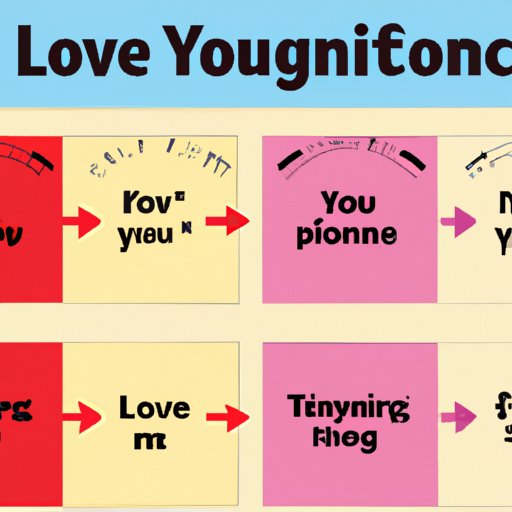Introduction
The phrase “I love you” is perhaps one of the most powerful things that can be expressed in any language. It carries with it a great deal of emotion and sentiment, and for some, it can also be a great source of anxiety. For those who are in a relationship or hoping to enter one, one of the questions they may ask themselves is when is the right time to say “I love you”.
Before we can answer this question, it’s important to define what “I love you” means. The definition of love itself is complex and open to interpretation, but for the purposes of this article, it will refer to an intense feeling of affection and attachment towards another person.
It’s understandable why people would want to know when to say “I love you”. After all, the wrong timing could be disastrous. Saying it too soon could cause your partner to feel uncomfortable, while saying it too late could make them think you don’t really care about them.
Analyzing the Pros and Cons of Saying “I Love You” Too Soon
When it comes to saying “I love you” too soon, there are both pros and cons. On the one hand, it can be seen as a sign of commitment and dedication. By expressing your feelings early on, you’re showing your partner that you’re serious about the relationship and that you’re willing to take it to the next level.
On the other hand, saying “I love you” too soon can also be seen as a sign of immaturity. If you haven’t known each other for very long, it can come across as if you’re trying to rush things. Your partner may not feel the same way as you do, and this could lead to hurt feelings and resentment.

Examining the Psychology Behind Saying “I Love You”
In order to understand when to say “I love you”, it’s important to look at the psychology behind it. One important concept to consider is attachment theory, which states that humans have a need to form close relationships with others in order to feel secure and safe.
It’s also important to recognize that there are different levels of intimacy in relationships. As you get to know someone better, you may start to feel a stronger connection and bond. This can be a sign that you’re ready to express your feelings for them.

Exploring the Different Types of Love and When to Say “I Love You”
Another factor to consider is the type of love you’re expressing. There are three main types of love: platonic, romantic, and familial. Each type of love has its own set of rules and expectations, so it’s important to be aware of the differences before you express your feelings.
Platonic love is typically non-sexual and is based on friendship. If you’re in a platonic relationship with someone, it’s best to wait until you’ve gotten to know each other well before saying “I love you”.
Romantic love is typically more intimate and passionate. If you’re in a romantic relationship, it’s usually okay to express your feelings after you’ve been dating for a few months.
Familial love is often unconditional and unwavering. If you’re in a familial relationship with someone, it’s usually okay to say “I love you” as soon as you feel ready.
Investigating Cultural Norms for Saying “I Love You”
It’s also important to consider cultural norms when it comes to expressing love. Different cultures and societies have different expectations when it comes to expressing feelings. In some cultures, it’s perfectly normal to say “I love you” soon after meeting someone, while in others it’s considered inappropriate.
It’s also helpful to look at historical practices. In some cultures, it was common for couples to wait years before expressing their love for each other, while in others it was expected to be done immediately.

Understanding Relationship Dynamics for When to Say “I Love You”
In addition to cultural norms, it’s important to consider the context of your relationship. What works for one couple may not work for another, so it’s important to examine your own situation and decide what’s best for you.
It’s also important to consider your partner’s perspective. If they’re not ready to express their feelings yet, it’s important to respect their wishes and give them time to feel comfortable.
Looking at the Science Behind Saying “I Love You”
Finally, it’s important to look at the science behind saying “I love you”. Chemistry plays a big role in forming relationships, and hormones like oxytocin and dopamine can help foster feelings of love and attachment. Biology also plays a role, as certain genetic factors can influence how you perceive and respond to love.
Conclusion
In conclusion, it’s important to be mindful of the pros and cons of saying “I love you” too soon, as well as the psychology, different types of love, cultural norms, relationship dynamics, and science behind it. Ultimately, it’s up to you to decide when you’re ready to express your feelings, but it’s important to be respectful of your partner’s wishes and take your time to get to know each other.
(Note: Is this article not meeting your expectations? Do you have knowledge or insights to share? Unlock new opportunities and expand your reach by joining our authors team. Click Registration to join us and share your expertise with our readers.)
